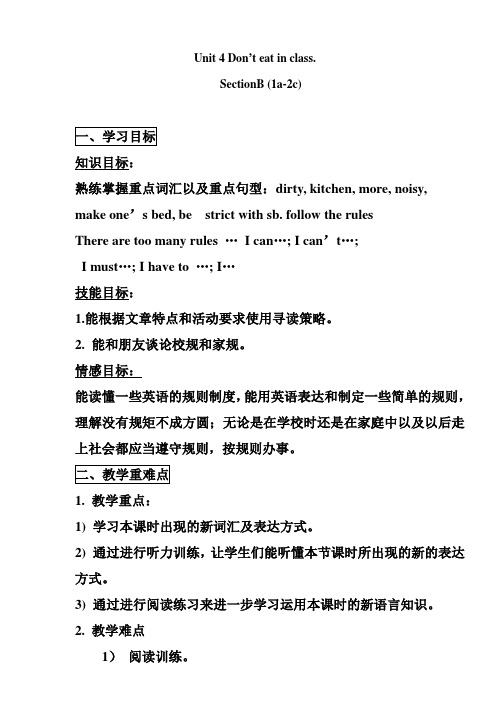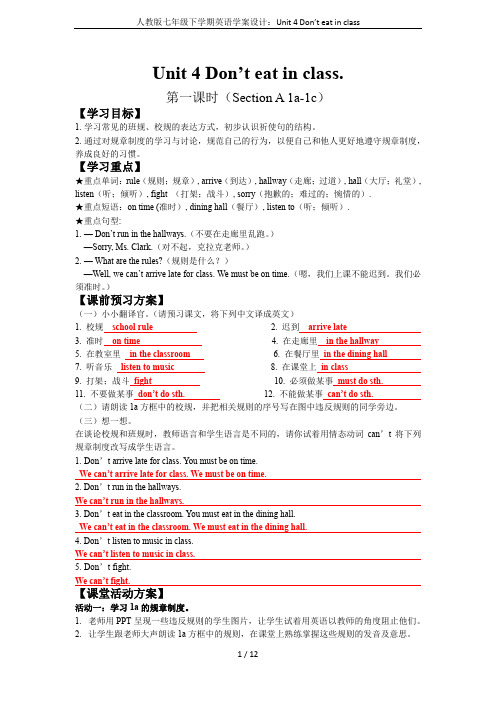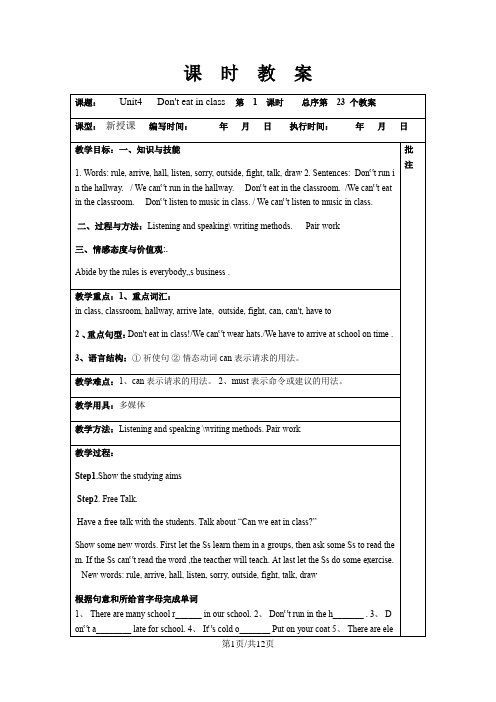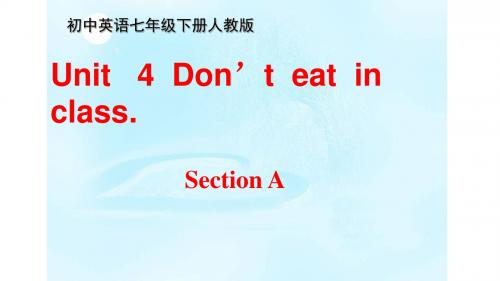最新人教版七年级英语 Unit4 Don't_eat_in_class_教学课件[1]
人教版七年级英语上册教案Unit 4 Don't eat in class第二课时

第二课时Section A (Grammar Focus-3c) 课时目标观察下列句子并总结规律1.Don't run in the hallways.2.Don't fight.3.Keep quiet.4.Never give up.5.Be a good student.6.Be quiet.7.Let's go.结论:祈使句的用法:祈使句是用来表示请求、命令、叮嘱、邀请、劝告等的句子,一般以动词原形开头。
祈使句的分类:①Do型祈使句(以Don't+动词原形开头)②V型祈使句(以行为动词原形开头)③Be型祈使句(以Be开头)④Let型祈使句(以Let开头)教学过程环节1新课导入T:As the proverb goes, “No rules, no standards”. Let's get to know some school rules.T:Can we arrive late for class?Ss:No, we can't.T:Can we run in the hallways?Ss:No, we can't.T:Can we eat in the classroom?Ss:No, we can't. We can eat in the dining hall.T:Can we listen to music in class?Ss:No, we can't.T:Can we fight?Ss:No, we can't....设计意图:通过用can的一般疑问句的问答,一来可以让学生明白一些应该遵守的规则;二来可以让学生学习怎么用can这个词来表达一些规章制度,也为下面讲can的用法做铺垫。
环节2学习Grammar Focus-3c1.让学生浏览并翻译Grammar Focus方框中的句子,并让学生用方框中的句子组成对话。
人教版七年级英语下册 Unit4 Don't eat in class SectionB 教案

Unit 4 Don’t eat in class.SectionB (1a-2c)知识目标:熟练掌握重点词汇以及重点句型:dirty, kitchen, more, noisy,make one’s bed, be strict with sb. follow the rulesThere are too many rules …I can…; I can’t…;I must…; I have to …; I…技能目标:1.能根据文章特点和活动要求使用寻读策略。
2. 能和朋友谈论校规和家规。
情感目标:能读懂一些英语的规则制度,能用英语表达和制定一些简单的规则,理解没有规矩不成方圆;无论是在学校时还是在家庭中以及以后走上社会都应当遵守规则,按规则办事。
1. 教学重点:1) 学习本课时出现的新词汇及表达方式。
2) 通过进行听力训练,让学生们能听懂本节课时所出现的新的表达方式。
3) 通过进行阅读练习来进一步学习运用本课时的新语言知识。
2. 教学难点1)阅读训练。
2)理解must, have to/ can/can't的用法三、学习过程Ⅰ. Warming- up and revision1. Greet the Ss.2. Check the homework. Let some Ss read their home rules.3.通过图片提问Do you know these signs in a city?What do they mean?4.再通过运用思维导图进行引导How many rules do you know?Ⅱ. Presentation1. Show some pictures on the big screen and let Ss learn the new words and expressions.2. 学生看着1a部分的图片___ go out___ see friends___ do his homework___ practice the guitar___ do the dishes___ watch TV___ help his mom make breakfast___ clean his room进行FREE TALKWhat can you do at home ?What can’t you do ?Can you go out on school nights?Ss: No, we can’t.T: Yes, in China, the students can’t go out on school nights.So please don’t go out on school nights.Ⅲ. Listening1. Tell Ss they'll listen to the recording about Dave's house rules. Listen and put an× for things Dave can't do and a √for things he has to do.2. Play the recording for the Ss to listen and check.3. Play the recording again for the Ss to check the answers.Ⅳ. Listening1. Now let's work on 1c. Now first, let's read the phrases aloud together.help his mom makebreakfastclean his roomWhat are the rules at your home?Can you go out on school nights?Do you have to do your homework first?Lead-inWhen you are unhappy about something, who do you like to talk to ?Task 1.Skimming (速读--默读)1. What’s Molly’s problem?2. Does she have rules in school?3. What does Molly think of the rules?Read 2b quickly and find the main idea. The main idea of the two letters is that___. A: there are many rules for MollyB: Dr. Know wants to help MollyC: Molly asks Dr. Know for some help and Dr. Know gives her some help.Task2. ScanningRead the letters again and complete the timeline (再读信,并且完成时间轴. )Task3.Detailed readingA).Read the first paragraph and fill in the blanks.B)Read the second paragraph and fill the rule made by her dad.C) Dr. Know's advice: We have to _____________.观察与思考求助信的写作格式:1)2)3)2c Read the letters again. Complete the sentences with have to/must, can or can’t.1. Molly _____ play basketball on school days, but she ____ play it on weekends.2. Molly _____ do her homework first when she gets home.3. Molly _____ read a book after dinner before she _____ watch TV.4. At school, Molly ____ be noisy or eat in class.5. Parents and schools make rules to help students. So students ______ follow the rules.Group worke.g.:At school/home/the library, we have to(must) ...We can't...(巩固)Language points1. _________ the guitar 练习吉他practice v.意为“练习”后面可跟名词、代词或动名词。
人教版七年级下学期英语学案设计:Unit 4 Don’t eat in class

Unit 4 Don’t eat in class.第一课时(Section A 1a-1c)【学习目标】1.学习常见的班规、校规的表达方式,初步认识祈使句的结构。
2.通过对规章制度的学习与讨论,规范自己的行为,以便自己和他人更好地遵守规章制度,养成良好的习惯。
【学习重点】★重点单词:rule(规则;规章), arrive(到达), hallway(走廊;过道), hall(大厅;礼堂), listen(听;倾听), fight (打架;战斗), sorry(抱歉的;难过的;惋惜的).★重点短语:on time (准时), dining hall(餐厅), listen to(听;倾听).★重点句型:1.— Don’t run in the hallways.(不要在走廊里乱跑。
)—Sorry, Ms. Clark.(对不起,克拉克老师。
)2.— What are the rules?(规则是什么?)—Well, we can’t arrive late for class. We must be on time.(嗯,我们上课不能迟到。
我们必须准时。
)【课前预习方案】(一)小小翻译官。
(请预习课文,将下列中文译成英文)1. 校规school rule2. 迟到arrive late3. 准时on time4. 在走廊里in the hallway5. 在教室里in the classroom6. 在餐厅里in the dining hall7. 听音乐listen to music 8. 在课堂上in class9. 打架;战斗fight 10. 必须做某事must do sth.11. 不要做某事don’t do sth. 12. 不能做某事can’t do sth.(二)请朗读1a方框中的校规,并把相关规则的序号写在图中违反规则的同学旁边。
(三)想一想。
在谈论校规和班规时,教师语言和学生语言是不同的,请你试着用情态动词can’t将下列规章制度改写成学生语言。
人教版英语七年级下册Unit_4Don’t_eat_in_classSection_AGrammar

dining hall
A: Can we listen to music in the
classrooms? B: No, we can’t. We can’t listen to music
in the classrooms. But we can listen to it
(he/ have to/ in the dining hall)? A:N__o_, _h_e_d_o_e_s_n_’_t._H__e_c_a_n__a_ls_o__ea_t__o_u_ts_i_d_e.
3. Listen to music? Q:C__a_n_w__e_l_is_t_en__t_o_m__u_s_ic__in__t_h_e_h_a_l_lw__a_ys?
ride bikes at school.
A: Can we arrive late for class?
B: No, we can't. We can’t arrive late for class.
A: So, don’t arrive late for class.
arrive late for class = be late for class
m__u_s_ic_.___ 4. _D_o_n_’_t_t_a_k_e_
_p_h_o_t_o_s._
3b Use the words to make questions about the rules. Then write answers according to your school.
1. Be quite? Q: _D_o_e_s_s_h_e_h__a_v_e_t_o_b_e__q_u_ie_t_________
人教版英语七年级下册-Unit-4-Don't-eat-in-class-语法解析

2021/2/4
1
6
疑问句: must 提前,回答时注意一二人称的互换。肯定用 must, 否定用needn’t. e.g. --Must I go home now?
-- Yes, you must. -- No, you needn’t.
B: And I must clean my room every Saturday. =?
A: Wow, you do have a lot of rules!
2021Dr. Know, There are too many rules! At 6:00 a.m. my mom says, “Get up now and make your bed!”
too many rules “太多的规定”, 其中too many 用来 修饰可数名词复数rules。 e.g. He has too many friends to meet.
修饰不可数名词时, 要用too much e.g. We have too much work to do.
much too 太……much 用来增强语气。后接形容 词或副词。
What can I do. Dr. Know? Molly Brown, New York
表“看”的单词?
either 也。用于否定句和疑问句中。肯定句中用too 表也。
watch,see,look r,read
2021/2/4
1
13
Dear Molly, I know how you feel. People always tell us, “ Don’t do this!” or “You can’t do that!” But think about it, Molly. There are a lot of things you can do. You can play basketball on weekends. You can watch TV after you read a book. Parents and schools are sometimes strict,
人教新课标七年级下册Unit_4_Don't_eat_in_class 公开课电子课件

A Lesson Plan(The third plan for Unit 4)I . Aims and requirements:1. To make students learn by heart some words about agriculture2. To talk about rules in people's daily life3. To develop their abilities to think and speak in EnglishII. Contents:(Junior English, Book2, Unit4 Don’ t eat in class. )1. Words and expressions:Rule, arrive, outside, important, bring, take, quiet, practice, dish, before, after, kitchen, dirty, relax, strict, remember, forget, listen to, go out, make one’s bed, be strict with sb.2. Sentence patterns:What are the rules? What do you have to do?Don’t eat in class. Don’t run in the hallways.Don’t listen to music in the classroom.Can we wear a hat in class? Yes, we can. No, we can’t.III. Key and difficult points:1. To consolidate the usage of present simple tense2. To know the structure and usage of imperative sentences3. To let students express their ideas with their own wordsIV. ProceduresStage l. Warming -up and lead-in (about 2 minutes)To greet with students as usualAre there any rules in your family?Stage 2. Revision (about 5 minutes)To review some words we learnt in last classTo talk about the rules we learnt in last classStage 3.Pre-reading (about 6 minutes)When you are unhappy about something, who do you like to talk to? (Brainstorming)How does Molly feel about the rules?Why does parents and schools make rules?Stage 4. Reading (about 20minutes)l). Skimming* Read the whole passage within 5 minutes and divide it int0 4 parts* Give main idea ofeach part to us2). Scanning* What is the biggest problem ofChinese farmers?* What does GM mean?Stage 5. Post-reading (about 8 minutes)Stage 6. Homework (about l minute)Finish the practice 2 0n page 47 after class。
人教版英语七年级下册Unit4 Don't eat in class全单元教案

T||ask 2Show Ss some pictures,||then let Ss talk about them with “W||e can‟t…../Don‟t……/We can……?” S1: W||e can‟t arrive late for class. /Don‟t ar||rive late for class. S2: We ca||n‟t run in the hallways. /Don‟t run in||the hallways.
3、语言结构:
①情态动词must与have to的用法②情态动词ca||n表示许可的用法
教学难点:1、用英语制定有关规定
2、情态动词must与have t||o的用法
教学用具:多媒体
教学方法:Li||stening and speaking \writing methods.||Pair work
教学过程:
教学用具:多媒体
教学方法:Listening and spea||king \writing methods. Pa||ir work
教学过程:
Step1.Show the studying aims
Step2. Free Talk.
Have a free talk wi||th the students. Talk||about “Can we eat in class?”
Task 1通过师生问答的方式复习祈使句||,引出情态动词,呈现本课的教学难点。T: L||et‟s say the school rul||es using can ,can‟t, mus||t, have to . S1: We can‟t||arrive late for class. /Don‟t arri||ve late for class. S2: We can‟t r||un in the hallways. /Don‟||t run in the hallways.Task 2||操练句型直至学生熟练的掌握Step5.Consolad||ation.
人教版七年级英语下 Unit 4 Don’t eat in class. Section A (1a-2d)公开课教学课件共26张PPT

2d Role-play the conversation.
John: Hi, my name’s John. It’s my first day at school. Alice: Hi, John. I’m Alice. This is a great school, but
there are a lot of rules. John: Really? What are some of the rules? Alice: Well, don’t be late for class. This is very
校规
Don’t arrive late for class . Don’tlisten to music in class .
上课迟到
听音乐
在课上
You must be on time.
准时
Don’t fight . 打架
hallway
走廊
在走廊里跑
Don’t run in the hallways. Don’t eat in the classroom .
初中英语七年级下册人教版初中英语七年级下册人教版unitclasssection校规fight打架dontarrivelateclass上课迟到listenmusic听音乐class在课上youmusttime
初中英语七年级下册人教版
Unit 4 Don’t eat in class.
Section A
(3)must 与 have to 有时可以互换
eg:I must go home now= I have to go home now.
(4) 注意have to 的否定式 don’t / doesn’t have to eg: He doesn’t have to get up early.
- 1、下载文档前请自行甄别文档内容的完整性,平台不提供额外的编辑、内容补充、找答案等附加服务。
- 2、"仅部分预览"的文档,不可在线预览部分如存在完整性等问题,可反馈申请退款(可完整预览的文档不适用该条件!)。
- 3、如文档侵犯您的权益,请联系客服反馈,我们会尽快为您处理(人工客服工作时间:9:00-18:30)。
umbrellas here!
禁止放湿雨伞!
No food! /Don’t eat food here!
禁止吃食物! No smoking! /Don’t smoke here! 禁止吸烟!
Form sentences
1. late, don’t, for school, arrive Don’t arrive late for school. 2. music, listen to, in the classroom, don’t Don’t listen to music in the classroom. 3. eat, can’t, in the classroom, we We can’t eat in the classroom.
We have to wear sneakers for gym class.
在体育课上,我们必须穿运动鞋。
Tom has to practice the guitar every day.
汤姆每天必须练习弹吉它。
I had to get up at 5:00 am last Monday.
上周一我不得不早上5点起床。
We can’t eat in the classroom.
What are the rules? We can’t listen to music in class.
What are the rules? We can’t fight.
2a Listening
1. √___ listen to music in the classrooms or hallways can can’t 4. ___ √ eat in the classroom
2b Listening
1. ___ listen to music in the classrooms or hallways can (can’t ) 4. ___ eat in the classrooms can (can’t)
7. ___ wear a hat can (can’t)
3. ___ listen to music outside can can’t
听说你生病了, 我很难过。
I never heard such an interesting story.
我从来没听过这么有趣的一个故事。 (2) listen“听”侧重于“听”这一动 作。 Listen to me carefully.
认真听我说。
The children like to listen to music.
2b Listening
Rule
Emily Dave ___
Don’t watch TV after school. ___ Don’t go out on school nights. ___ Don’t your homework after
___ ___
___
school.
___
Practice your guitar every day.___
Which rules are these students breaking?
Don’t fight.
SCHOOL RULES 1. Don’t arrive late for class. You must be on time. 2. Don’t run in the hallways.
3. Don’t eat in the classroom.
不, 我不必。
Did he have to go to bed by 11:00 last
night? 昨晚他不得不11点前上床睡觉吗?
2. 情态动词can的用法
(1) 表示能力 “会, 能” Can you play the guitar? 你会弹吉它吗? Judy can speak a little Chinese. 朱蒂会说一点中文。
2c Pairwork
A: Can we listen to music, Alex? B: We can’t listen to music in the hallways, but we can listen to it outside.
Grammar
肯定祈使句 否定祈使句
Sit down.
Which rules are these students breaking?
Don’t eat in the classroom. You must eat in the dining hall.
Which rules are these students breaking?
Don’t listen to music in class.
7. ___ √ wear a hat
can can’t
can can’t
3. ___ listen to music outside can can’t
8. ___ √ fight can can’t
can can’t
2. ___ √ listen to music in the music room 5. ___ √ eat in the dinning hall. can can’t 6. ___ eat outside can can’t
Section B
Can you run in the hallways?
No, we can’t.
Can you go out on school nights? No, we can’t.
Do you do your homework after school?
Yes, I do.
Do you practice your guitar every day?
孩子们喜欢听音乐。
(3) sound“听起来”,它是系动词, 后面 接形容词等。 That sounds great.
那听起来真不错。
It sounds like fun. 听起来挺有趣。
4. arrive late for 与be late for 意思相近,
“迟到”
Don’t arrive /be late for school.
Tapescript
Dave: Can you go to the movies tonight,
2a Listening
___ 4 Don’t watch TV after school. ___ 1 Don’t go out on school nights. ___ 2 Do your homework after school. ___ 3 Practice your guitar every day.
(2) 否定形式:主语+don’t have to+动
词原形+其他 (一般现在时,主语是
第三人称单数时, 用doesn’t have
to; 句子是过去时, 用didn’t have to)
如:
Nick doesn’t have to wear a uniform.
尼克不必穿制服。
We didn’t have to do our homework
Yes, I do.
Do you watch TV after school?
No, we don’t.
Don’t go out on school nights.
Do your homework after school.
Practice your guitar every day.
Don’t watch TV after scho业。
(3) 疑问句: Do (Does或Did) +主语
+have to +动词原形+其他
如: Do you have to stay at home on
weekends?
周末你必须呆在家里吗?
Yes, I do. / No, I don’t.
是的, 我必须。
上学别迟到。
I arrived/was late for the meeting yesterday. 我昨天开会迟到了。
5. No talking ! “禁止交谈!”no后 面加上名词或动名词(doing) 也表 示不要做某事。与don’t +do的用
法相似。
No wet umbrellas! / Don’t put wet
Come in.
Don’t sit down.
Don’t come in. Don’t eat at home.
Eat at home.
Listen to music outside. Don’t listen to music outside. Do your homework at school. Don’t do your homework at school.
祈使句的否定形式多以do not (常缩
写成don’t) 开头, 再加上动词原形。
Don’t arrive late for school.
上学别迟到。
Don’t fight! 别打架!
Don’t look out of the window.
不要向窗外看。
Explanation
1. 情态动词have to 的用法, 意思是“必 须、不得不”,它侧重于客观上的必要 和外界的权威。 (1) 结构:主语+have to+动词原形+其 他 (一般现在时,主语是第三人称单数 时, 用has to;句子是过去时, 用had to) 如:
祈使句是用来表示请求、命令、叮嘱、 号召或者劝告等的句子, 这类句子的主语 常是第二人称you,也就是听话者,因而you 常省去了。祈使句的开头是动词原形。
如: Look out! 小心!
Wait here for me! 在这等我! Be sure to come here on time! 务必准时来到这里!
